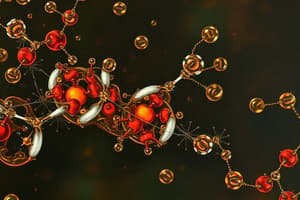Podcast
Questions and Answers
What role do enzymes play in biological systems?
What role do enzymes play in biological systems?
- They act as biocatalysts for chemical reactions. (correct)
- They undergo permanent changes during reactions.
- They are solely responsible for chemical reactions.
- They increase the temperature of reactions.
Which statement is true about the nature of enzymes?
Which statement is true about the nature of enzymes?
- They are primarily protein in nature, except for ribozymes. (correct)
- They are uniformly large without specific active centers.
- They can be inorganic compounds.
- They are thermally stable and can withstand high temperatures.
What was the significant contribution of Buchner in 1883 regarding enzymes?
What was the significant contribution of Buchner in 1883 regarding enzymes?
- He isolated the enzyme system from cell-free yeast extract. (correct)
- He identified the first enzyme structure.
- He coined the term enzyme.
- He discovered a method to synthesize enzymes artificially.
How does the action of enzymes compare to strong acids in protein hydrolysis?
How does the action of enzymes compare to strong acids in protein hydrolysis?
Which of the following is NOT a characteristic of enzymes?
Which of the following is NOT a characteristic of enzymes?
What does the term 'catalysis' refer to?
What does the term 'catalysis' refer to?
Which enzyme-related term was coined by Kuhne?
Which enzyme-related term was coined by Kuhne?
In what year did Berzelius coin the term 'catalysis'?
In what year did Berzelius coin the term 'catalysis'?
What is a key difference between a catalyst and an enzyme?
What is a key difference between a catalyst and an enzyme?
Which of the following is an example of an enzyme's specific action?
Which of the following is an example of an enzyme's specific action?
Flashcards are hidden until you start studying
Study Notes
Enzymes as Biocatalysts
- Enzymes function as biocatalysts, accelerating the rate of chemical reactions without changing during the process.
- Analogous to a teacher-student dynamic, where a teacher (catalyst) enhances the students' (reactants) understanding.
- Enzymes are synthesized by living cells and primarily composed of proteins (with RNA-based ribozymes as an exception).
- Characteristics of enzymes include:
- Colloidal nature
- Thermolability
- Specific action on substrates.
- Digestive enzymes in the gastrointestinal tract digest proteins at body temperature (37°C) within hours, contrasting the prolonged hydrolysis with strong acid at 100°C.
Importance of Enzymes
- Enzymes are essential for life, facilitating necessary biochemical reactions that would otherwise occur too slowly.
- The existence of life itself is closely linked to the presence and functionality of enzymes.
Historical Background of Enzyme Research
- 1836: Berzelius coins the term "catalysis," derived from the Greek term for “to dissolve.”
- 1878: Kuhne introduces the term "enzyme" to describe catalysis within biological systems, referencing yeast.
- 1883: Buchner achieves the isolation of enzyme systems from cell-free yeast extracts, identifying the active component as zymase, responsible for converting sugar to alcohol.
- 1926: Introduction of the first crystalline enzyme, urease, marking significant progress in enzyme study.
Studying That Suits You
Use AI to generate personalized quizzes and flashcards to suit your learning preferences.





